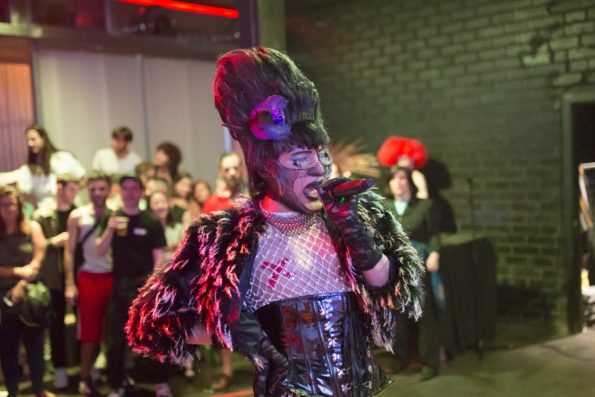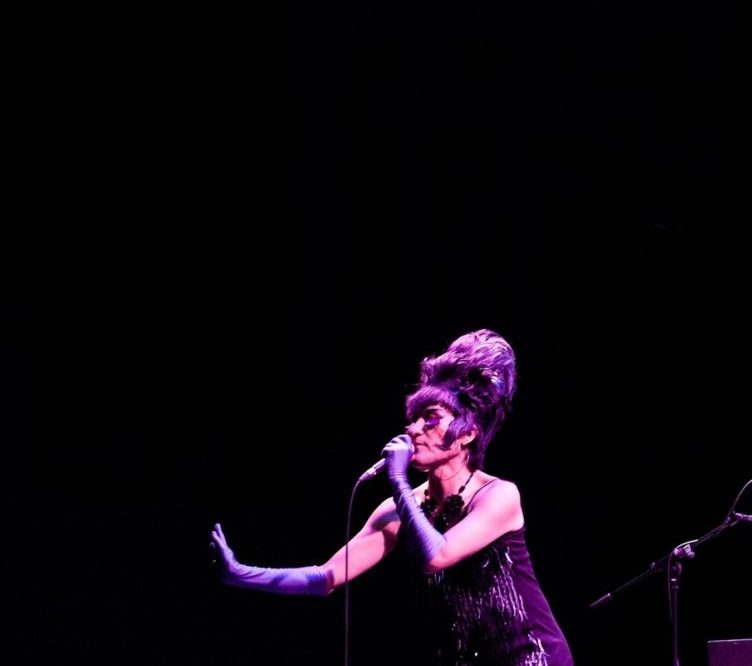Search
To search for an exact match, type the word or phrase you want in quotation marks.
A*DESK has been offering since 2002 contents about criticism and contemporary art. A*DESK has become consolidated thanks to all those who have believed in the project, all those who have followed us, debating, participating and collaborating. Many people have collaborated with A*DESK, and continue to do so. Their efforts, knowledge and belief in the project are what make it grow internationally. At A*DESK we have also generated work for over one hundred professionals in culture, from small collaborations with reviews and classes, to more prolonged and intense collaborations.
At A*DESK we believe in the need for free and universal access to culture and knowledge. We want to carry on being independent, remaining open to more ideas and opinions. If you believe in A*DESK, we need your backing to be able to continue. You can now participate in the project by supporting it. You can choose how much you want to contribute to the project.
You can decide how much you want to bring to the project.

“My mahogany-gold braided bow with fancy pearls scorned your artistic myopia. My false eyelashes, like faithful squires, protected me from your conservative and simple context. My fabulous dress woven and darned by the hands of an ancestral woman dethroned your phallocentrism. My pink liquor gloves fisted your oppressive ass and heteronormity of mind. My complicit tights that twinned me with other dissident marikas clouded your senses to the point of making you doubt your own hetero-patriarchal system. My de-luxe tacos stung your racist and classist lightness and infected your galleries, museums, media and networks. My glittering halo certainly offended your parsimony and bad taste by infesting your social bubble. My transvestite body endowed with corrosive glamour took your capital city by storm, sodomizing it countless times. To be a fetish. Abject entity. Prosthetic luxury. I came, I transvestited and I conquered. I’ve won. While I’m dancing itsy bitsy teeny weeny yellow polka dot bikini, my ego is satisfied, full and overflowing like teenage sperm. I was crowned the thousandth wonder of Peru-wonderland. Become a living myth. Performing fabulousness. Frau Diamanda, a diva with a social mission. Be Narcissus or die trying”.
Tabula Rasa Travesti
Frau Diamanda
2014
Travestite stubbornness
By embracing transvestite conceptuality in and from my own body and way of life, I not only entrench myself in the multiple negative semantic charges of the term as the prostibular, perverse, sick, precarious, marginal, infectious and despicable as opposed to the domesticated, westernised and hygienised “trans”, but I also try to slip in a different idea to capitalist production based on wage earning capacitism; I like the opposite sense of wild and primitive waste, just as sex and sexuality are. Relaxation, not containment. Waste of sexual energy that spreads through space, contaminating everything. The transvestite body is in itself exoticized and fetishized, then, the emplaced strategy consists of turning the oppressive context around via methods of hyper sexualization, uber visibilization and corrosiveness, until one gets fed up. A body understood in this way expands to unimaginable limits where the immediate becomes a geopolitical transfer, something they also call transmigration: the transvestite moves like a mutant entity defying all kinds of protocols, including those of migration control. When such a displacement is established, affective networks and political complicities are indispensable and contextual apprehension at full speed is imposed as a matter of course. The tools at our disposal are totally linked to a collective transvestite sentiment that influences a conjugation of the extremely feminine, the ingenuity, the acidity and the evil that configure the real world in a sinuous and neo-baroque package of hyper-realism opposed to the hetero-patriarchal norm. We have been forced to design survival and self-defense tactics immersed as we have always been since the imposition of the colonial-Catholic order that never accepted our condition of bodies in a state of hybridity. However, our propensity to wander with mind and wit enabled us to recreate intelligible and pompous, almost cryptic worlds. Egocentric, mythomaniacal and hyperbolic, we were able to slip in transvestite rhetoric that infects the heteropatriarchal paradigm that has ignored us and seeks our extinction.
From Sudakaland to the “first” world?
We transvestites cannot be forgiven for having had privileged access to education and culture, especially in the classist and racist artistic spheres typical of the great capitals of the world. We are looked upon with distrust or a certain paternalism. They are not yet able to understand the tremendous creative potential we possess, which stems precisely from the extreme atmosphere of violence to which our precarized and racialized bodies have been continuously overexposed and which has forced us to survive. However, this immense stubbornness that characterizes us and that has determined our aesthetic-political alignment, is the right and precise key to propose new looks and critical approaches in the real, artistic and musical world. In the new “first world” context of art, there are obviously also interests in (re) cultural and epistemological appropriation through the exoticization of that other being, immigrant and alien, prone to be cannibalized for the sake of a pseudo lgbtqi inclusion of the assimilationist and spectacle-hungry cutural policies of theory and academia, pure congenial capitalism. In this sense, Barcelona is not left behind. However, the city’s city, having been forged geopolitically from the clash and intertwining of different cultures, provides a number of quite interesting collateral realities for a newcomer from anti-racist activism, the squatting movement, effective exercises in resistance to various forms of capitalism, the extension of affective networks of migrant aid, highly healthy transfeminist networks and even a thriving underground art and music scene, and, of course, all this framed in an atmosphere with airs of Catalan independence and its eternal tension with the central government of the Spanish kingdom.
Transvestite skin infection
It is curious to note how the class devices in the art world are being dismantled by their own logic of careerism and meritocracy. The artistic rise does not translate into capitalist performance per se, but it is established as an ad hoc cultural good, for example, in the cybernetic times we live in, this is translated into the amount of likes or views that the artistic work receives, this immediacy perhaps makes us insatiable and infinitely narcissistic. In any case, it is a question of privileges. What to do then with these privileges of belonging to a specific sector? Well, I would suggest diving into uncertainty and analysing it from within as our own experience and creative breeding ground. It is precisely these underestimated social anomalies that have strongly nourished many of my proposals in the Barcelona art scene. Thus, I was part of a creative project on forms of encounter in the social fabric of Barcelona, Personae 21, activations with an encounter format that the Macba placed as a living and interrelational complement to the exhibition “In the Open or in Stealth”, broadening the curatorial spectrum of Raqs Media Collective. From the PEI – Independent Studies Program – period 2017-2018 of which I was the beneficiary of a grant for artistic trajectory, we slide innovative proposals, mine, specifically “stained” by such social anomalies as the squatting movement, anti-racist activism, the becoming of cruising in public spaces – hidden to the common eye -, a real and effective route of recycling food saved from the wild and cruel capitalist hyper production and even a route through that off Barcelona that would never appear in the brochures for serialized tourists. By assuming the rol of travestite moderator I could do such a proposals and, at this point, I would like to thank the people I involved, Linda Porn, Julieta Lara, Leopold Estapé, Colectivo Xarxa Barcelona, la Nova Usurpada and Jordi Corominas i Juliá. As a racialised and precarious transvestite Sudaka immigrant, the auscultation of the environment is fascinating, as if it were a highly sexualised and anodyne anthropological exercise. What many might consider a social disadvantage, becomes plastic material for the generation of proposals impregnated with the close experience and are embodied in the grotesque reality or the mere intervening curiosity.
Sexualization of spaces
Personally, it is quite clear to me that there are dissimilar forms of empowerment, and one of them, quite powerful, is the sexualization of public space. In this sense, offering your own body and sex as a currency of intercultural exchange is a good way to the limit of apprehending the context and re-semantizing it, your own being becomes a trigger of knowledge using other languages, beyond the conventional ones – touch, skin, heat, etc. – and thus stories written with fluids, or skin-memory are inscribed far from the concept of a theoretical archive, where participants dialogue with codes that can finally be broken and expanded. The project “Escenes Catalanes: Errancias Antropologico-sexuales” (Catalan Scenes: Anthropological and Sexual Errors), which I began in 2016, almost as soon as I arrived in Barcelona, is a kind of detective iderivism that, by way of experiment and error, attempts a mapping or cartography of a desire for sexual wandering, based on the ephemeral, as is a casual encounter that provides spontaneous empathic interrelationships prone to affective analysis. As an audiovisual transvestite artist who works with the immediate and the contextual – from my own sex-affective experiences to community projects – another of the areas that has generated a lot of inspiration for me is the Barcelona “squatter” movement, which has provided me with a new way of looking at socio-cultural activism and its effective confrontation with capitalism and real estate speculation. Thus, I designed an aesthetic-photographic research project based on the location of the drift of desire, the contrast of the physical body with the (counter)architectural space and the new male sensibilities. Through photography, and also through video, I developed an aesthetic dialogue strongly linked to the sexual aspect between the camera and the lens/object, sexualizing it through erotic, fetish, sadomasochistic, camp, queer and voyeur mechanisms in this type of spaces where effective micropolitics are exercised. In this way, the transvestite, displaced in time and space, makes infectious proposals that reflect a feeling impregnated with native wisdom. Transvestite time is the time of patience, constancy and stubbornness. We wait wise.
(Featured Image: Photo by Marcos Gómez Barker)

Héctor Acuña/Frau Diamanda (Lima, 1971)
Translator, writer, audiovisual transvestite artist, drag performer, cultural infidelity, visagist, DJ and possible actress. I specialize in transgender art and multimedia performance and am currently developing a neo-baroque transvestite aesthetic in writing. My main practice is as an audiovisual artist and curator, I work mainly with photography, video, electronic music and multimedia platform. I am interested in the (dis)encounters between bodies and architectures and the ways to concatenate the fluidity of desire and the sexualization of spaces through a gaze of transvestite sexual disobedience.
"A desk is a dangerous place from which to watch the world" (John Le Carré)